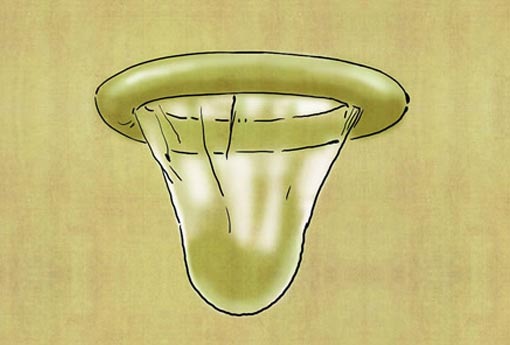Basic Information
Chinese name condom
Foreign name Condoms, also known as condoms, small umbrellas, small raincoats, etc.
Contraception, block the transmission of germs
Dyeing Material Latex, polyurethane, new composite nano, etc. Applicable age 18-60 years old
A brief history
In 2000 BC, condoms appeared in the life of ancient Egyptians. At that time, they were called condoms. Their function was not to prevent diseases and contraception. They were used as ornaments like jewelry worn by women. It is a symbol of wealth and status.
More than 1000 years ago, the ancient Egyptians began to use the bladder or cecum of animals such as goats and pigs as condoms. Since that era, condoms have been used to protect against disease and infection.
In the Cambarilles cave in the Dordogne region of southern France, some condom frescoes created in AD 100 have been found, which are regarded as the earliest evidence of condom use in Europe.
At the end of the 15th century, Columbus discovered the New World, and sailors also brought syphilis back to Spain from the Americas, and syphilis spread in Europe. Faropis invented a linen condom and experimented with it in 1,100 men, none of whom contracted syphilis.
In the 16th century, records about condoms appeared in the experimental records of anatomist Faropis of the University of Padova in Italy. He first publicly described the experimental use of condoms to prevent disease The earliest written record of condoms.
The male condom was invented in the 17th century by Doctor Condom, the imperial physician of King Charles II of England. Its raw material is lamb's cecum, the best product can be as thin as 0.038 mm (latex condoms are generally 0.030 mm). this was a great event that shocked the world at the time. Dr. Condom was awarded a knighthood for this invention, and the United Kingdom also earned a lot of foreign exchange from it.
Around 1640, the oldest existing condom in the world was born. It was made from fish swim bladder and animal intestines. It has a history of more than 300 years. One end of the condom is sewn with silk thread, and the opening at the other end can be locked to prevent slipping. The 10 condoms found in Dudley Castle, near Birmingham, England, were once displayed in a sex exhibition in the Netherlands and are now as dry as dead leaves due to their age.
In the 18th century, the Japanese used two types of condoms, one soft was made of leather; the other hard was made of turtle shell or animal horn.
From 1725 to 1798, the swinger Casanova introduced the details of the trial contraceptive method in his autobiography. He recounted that he had attempted to use the rind of half a lemon as a primitive cervical cap.
In 1766, many shops began producing leaflets and advertisements about condoms.
In 1838, German doctor Friedrich Wilde opened a small cervical cap to his patients, which could cover the cervix during menstruation. This contraceptive method was never widely used, but the so-called "Wilde cap" became the precursor to the modern cervical cap.
In 1839, Charles Goodyear invented the rubber vulcanization technology and put it into practical application to produce rubber condoms, intrauterine devices, genital douches and cervical caps.
By the early 1930s, the manufacturing technology of condoms was innovated again, and liquid latex replaced the traditional rubber sheet, which is still the basic raw material of condoms to this day.
In the 1970s, a wide variety of contraceptive devices appeared in the United States, such as condoms, contraceptive sponges, douches and cervical caps.
The 1990s saw the latest developments in condom materials, with condoms made from a single polyurethane, which is twice as tough as latex, making it possible to make thinner, more sensitive condoms.
On April 14, 2015, scientists developed hydrogel condoms: more pleasure than not wearing a condom.
Material size
material
block
In the 1830s, Westerners invented a small hexagonal wooden block - something similar to a "uterine sheath" to prevent women from getting pregnant, but this contraceptive was later called "a device to torture women". .
sheep intestines
In the 17th century, the British physician Joseph Condham invented the modern condom. This condom is made from the caecum of a lamb. Condham first cut the sheep intestines into appropriate lengths, dried them in the sun, and then used grease and wheat bran, etc. Softener to soften it until it becomes a thin rubbery consistency.
linen cover
At the end of the 15th century, Pharopis invented a condom made of linen cover and experimented with condom use among 1,100 men, none of whom contracted syphilis.
emulsion
Most condoms are made of latex. about 8% of the population is allergic to latex, please use it with caution.
Polyurethane
Suitable for people allergic to latex. The condom made of polyurethane has strong toughness and thermal conductivity, and its elasticity is not as good as that of latex, like a plastic bag. However, the ultra-thin thickness of 0.03mm can increase the user's pleasure. Not allergic either.
New composite nano
A new generation of condoms, researched at the University of Manchester in the UK, will use a new composite nanomaterial that combines the elastic polymer latex used in conventional condoms with graphene.
super material graphene
On November 22, 2013, a group of scientists from the University of Manchester in the United Kingdom studied the use of super material graphene to create thinner and tougher condoms. The graphene condom is thin, light, and 200 times stronger than steel.
other materials
For contraception, the ancients have gone through countless explorations. The ancient Greeks and Romans stuffed all sorts of things into women's vaginas. For example, lump honey, cedar gum, or even crocodile dung.
In ancient China and Japan, silk oiled paper, rags, and sponges were inserted into the female vagina as a barrier. The ancient Chinese also used fish fat as condoms.
size
Condoms, also known as condoms, are the most commonly used male contraceptives, with a length of about 19 cm and a seminal vesicle about 2 cm long at the distal end, which is where semen is stored during sexual intercourse; The mouth) has a slightly elastic rubber ring, which has the effect of tightening the penis when it is put on the penis.
There are 4 kinds of condom specifications in China, and the condom size classification of different brands is unified. Nominal width refers to half the circumference of the condom opening.
Large condom: A condom with a nominal width of 55mm has a diameter of 35mm at the opening.
Medium condom: A condom with a nominal width of 52mm has a diameter of 33mm at the opening.
Small condom: A condom with a nominal width of 49 mm has a diameter of 31 mm at the opening.
Extra-Small Condom: A condom with a nominal width of 48mm has a diameter of 29mm at the opening.
Classification
by gender
male condom
ISO 4074 is the international standard for male latex condoms.
According to their diameter, condoms sold in China can be divided into 4 types, namely large size (diameter 35mm); medium size (diameter 33mm); small size (diameter 31mm) and extra small size (diameter 29mm) ). The most common is the medium size.
According to the thickness, condoms can be divided into local thickening type (thickness A type: 0.36mm; B type: 0.28mm; C type: 0.20mm; D type: 0.12mm), ordinary type (thickness 0.04 ~ 0.06mm) , Ultra-thin (thickness 0.03 mm) and thin (thickness between the first two), the ultra-thin model is the advanced transparent condom commonly used in China.
There are various appearances. ①、Ordinary type, it is a latex rubber cover, the top of which has a small sac for storing sperm, and the body is smooth. ②, special-shaped, the body of the sleeve has 1 to 4 narrow segments. ③, corrugated type, the body is made of multi-layer corrugated or flower shape. ④, particle type, the surface of the sleeve is evenly attached with latex particles. 5. Local thickening of large particles, local thickening in the glans, coronal sulcus and dorsal frenulum, and adding smooth and large particles on the outer wall of the coronal sulcus. In the production process, spices can be mixed to make it emit a light fragrance of various flowers; if it is combined with anti-inflammatory drugs or sexual excitement retarders, it can play the purpose of anti-inflammatory and delaying sexual intercourse.
female condom
Female condoms are soft, transparent, strong and wear-resistant sheath-like sheaths made of polyurethane special materials, which have better thermal conductivity and toughness than general latex sheaths. It has a length of about 17 cm, a thickness of 0.42-0.53 mm, and a maximum diameter of 7.8 cm. The condom has a flexible loop at each end, the bottom of the condom is completely closed, it will be close to the end of the vagina when in use, the loop at the outer end is larger and thinner, and it will always be placed outside the vaginal opening to block the base of the male penis when in use Direct contact with the female vulva while acting is more effective in preventing the spread of germs than male condoms.
The female condom is coated with dimethicone as the main raw material, an inert lubricant that does not kill sperm, which can make the male penis move freely in the condom, and the user can also cooperate with the drip Various stimulant liquids to increase pleasure.
by use
blowjob condom
Usually used during oral sex on a male penis. The material is thin and the surface is smooth. At the same time, various aromas are added to increase the taste, and there are usually many fruit flavors. This makes it easier for women to accept. Avoid being offended by the smell of the penis itself.
Anal condom
The material of anal condoms is thickened, and its tensile force is more than 150% of that of conventional condoms. To avoid rupture during anal sex.
Invisible spermicidal condoms
This foam contraceptive method started in the United States in 2004. It can not only kill sperm and various viruses, but also is invisible and invisible at all. It is vividly called "invisible condom". Tested by the National Family Planning Commission and other authoritative institutions, it can make the sperm mortality rate reach 100% within 1 minute when diluted 6 times and 30 times.
It quickly and efficiently destroys surface tension such as sperm, thereby killing sperm and a variety of venereal disease viruses; quickly kills sperm and a variety of viruses.
The main function
1. Correct use of condoms can reduce the probability of contracting AIDS by 99.9% and the probability of contracting gonorrhea by 85%.
2. Locally thickened physical delay condoms condoms can prolong the time of sexual intercourse. For men with premature ejaculation, prolonging the time of sexual intercourse by more than 20% can treat premature ejaculation; the time required for women to reach orgasm is longer than that of men, so that women's sexiness is satisfied .
3. Some women have anti-sperm antibodies in their bodies. After sexual intercourse, sperm enter the cervix and combine with anti-sperm antibodies in the uterine mucus. After the combination, the sperm aggregates or brakes, and cannot continue to swim into the uterus, so infertility. Use condoms for three to six months to temporarily cut off contact with semen, so that the titer of anti-sperm antibodies in their bodies decreases, so that they may become pregnant in a short period of time after stopping condoms.
4. Some women experience genital itching, edema, chest tightness, shortness of breath and even urticaria-like symptoms after sexual intercourse. Condoms prevent semen contact and relieve semen allergy.
5. Condoms come in different shapes, colors, flavors, materials and sizes to make sex more fun.
6. Condoms provide women with safer protection, block the contact between the smegma and the cervix, and reduce the risk of cervical cancer.
7. Condoms can prevent ectopic pregnancy. Condoms prevent sperm from entering the vagina, so there is no pregnancy, and therefore no ectopic pregnancy. For women who suffer from salpingitis, tubal dysplasia or malformation, endometriosis, uterine dysplasia, etc., which are likely to cause ectopic pregnancy, it is better to use condoms than birth control rings.
8. The use of condoms in the third trimester can prevent intrauterine infection and the resulting premature birth or neonatal death.
Instructions
male
1. Before each sexual act, a new gel condom must be used; it must be worn before sexual intercourse and after erection;
2. Carefully tear open the individually sealed packaging bags and avoid sharp tools such as scissors;
3. Pinch the front end of the condom with your fingers, squeeze out the air, and then put it on the erect penis;
4. Reserve the space for the front end of the condom;
5. Ensure that the condom covers the entire penis;
6. If necessary, use water-based lubricants, oil-based lubricants (such as glycerin, white petrolatum) will cause the condom to rupture;
7. After ejaculation, while the penis is still erect, hold the edge of the condom and pull out the penis;
8. Do not keep the condom in the wallet or near the heat source for a long time.
female
Most people are used to male condoms when using topical safety measures. However, the female condom has also occupied a lot of market space with its unique advantages. Let's take a look at the principle of the female condom and how it is used.
If you're using a female condom for the first time, it's a good idea to practice how to put it inside.
1. First choose a position that you think is most comfortable: you can lie down, or sit with your legs apart, the built-in elastic inner ring should be at the end of the sheath opening.
2. Squeeze the lower half of the inner ring with your thumb, forefinger and middle finger so that you can grip and narrow the inner ring and put it into the body smoothly.
Push the squeezed inner ring as deep as possible into the vagina. A small amount of the outer ring and sheath will still be exposed outside the vagina, this is normal and nothing to worry about.
3. After sex, to avoid semen backflow, please remove the condom before getting up. Pinch and rotate the split ring as you remove it, while slowly pulling the condom out.
4. As with male condoms, the packaging or other tissues of female condoms should be thrown into the trash can, not into the toilet, so as not to cause blockages.
Precautions
Misunderstanding
Condoms don't fully protect against viruses
Traditional condoms have safety defects. Although traditional natural latex condoms are effective in contraception, although they have a certain barrier effect on viruses, they cannot effectively prevent viruses. Condoms are safe for contraception, but preventing the virus is not safe.
The condom products on the market, the material used is mainly natural latex, and its natural cracks are between 5000 and 70000 nanometers, which is enough to prevent the head of human sperm with a diameter of 5000 nanometers, but the diameter of HIV is only 120 nanometers. The diameter of tumor virus is between 45 and 55 nanometers, and the diameter of large spherical particles in hepatitis B virus is 42 nanometers. The volume of various viruses is much smaller than the natural cracks of natural latex. Even with the correct use of condoms, it is still possible to contract sexually transmitted diseases.
Reasonable choice of condom thickness
The thickness of the condom has a great influence on the psychology of men. The thicker the condom, the less sensitive the male penis is during sex.
There are three main types of condoms: ultra-thin, thin and ordinary. Among them, the thickness of the ultra-thin type is 0.03 mm, the thickness of the ordinary type is 0.04-0.06 mm, and the thickness of the thin type condom is between the two. A study in the United States shows that for every 0.01 mm decrease in thickness, men's comfort will increase by 20%.
Slim condoms are not for everyone. For men who ejaculate quickly, are older, and have poor self-control, thicker condoms should be used or a delayed condom should be used instead.
Thickened physical delay condoms and special delay condoms, thickened physical delay condoms use different thickness specifications in the most sensitive glans, coronal groove and back frenulum of the male penis according to the different sensitivity of men. Local thickening brings a green, safe, non-toxic and side-effect physical delay method for men with short time. Specialized delay condoms add zocaine, a desensitizing ingredient commonly used in medicine, to the lubricant, which reduces the sensitivity of male sexual organs, thereby prolonging sexual life.
Side effects of using condoms
Although condoms can be effective in contraception, excessive use of condoms is not conducive to women's health, and will have certain adverse effects on women's health. While preventing male semen from entering the female reproductive tract, it may also "cover" female health. The health benefits of semen cannot be ignored.
One is antibacterial and anti-inflammatory. Women who have a harmonious sex life 1-2 times a week do gynecological examinations, and the results show that only 10% of them suffer from vaginitis, cervicitis and other gynecological diseases, and the incidence rate is much lower than that of women who have less normal sexual life.
The second is to fight tumors. Scientists in South Korea have found that semen can fight ovarian cancer. The active ingredients extracted from the sperm-removed semen are injected into a culture medium containing epithelial ovarian cancer cells and normal ovarian epithelial cells, respectively. After 48 hours, it was found that the death rate of ovarian cancer cells was 81%, and the death rate of normal cells was 37%.
The third is that semen can promote the secretion of female sex hormones, make breasts plump and tender skin, can moisten the vagina, improve the quality of sexual life, enhance psychological satisfaction, and help play the role of sexual health care.
condoms during pregnancy
After pregnancy, although there is no need to worry about contraception, it is still necessary to wear condoms or ejaculate during pregnancy. After the prostaglandin in the male semen is attracted by the vaginal mucosa, it can promote the strong contraction of the uterus after pregnancy. It can cause abdominal pain in pregnant women, and can easily lead to miscarriage and premature birth.
misuse of condoms
Researchers have surveyed more than 1,100 men and women and found that nearly a quarter of them used condoms incorrectly within a month, such as fully unfolding the condom before putting it on, and women wearing condoms for their partners. When the air at the top is not exhausted, the condom will be broken if it is placed on the male body if it is not careful. When the male uses the condom, he will turn the inner layer on the outside and wear it, which will easily lead to pregnancy.
usage details
1. Do not put the condom in the body pocket or close to other heat sources. Prolonged exposure to heat sources will cause the rubber to age.
2. The best time to wear a condom is after the penis is erect and before the penis comes into contact with the genitals or anus.
3. Turn up the foreskin of the penis while using the condom, which increases flexibility and reduces the risk of the condom breaking during intercourse.
4. If the penis stops erection when using or placing the penis or is placed in the wrong direction, please use a new condom.
5. Special condoms should be used during anal sex. Anal sex condoms are specially thickened, and ordinary condoms are likely to rupture during anal sex.
6. Do not use expired condoms. Expired condoms are likely to rupture during intercourse.
7. After ejaculation, even if you still have an erection, please pull the penis out of the vagina or anus immediately to avoid unnecessary risks.
8. When pulling out the condom, hold down the base of the condom to prevent it from falling off.
9. Inexperienced users should practice using condoms in brightly lit places to ensure they are properly fitted before intercourse.
10. A new gel condom must be used before each sexual act.
11. There are different specifications of condoms, and the appropriate type should be selected according to the size of the penis when it is erected.
12. Check the production date and expiration date before use. Expired condoms have deteriorated and are easy to break, so they should not be used.
13. Condoms must be kept in a cool, dry and non-contact environment with acids, alkalis and oils. If it becomes sticky and brittle after exposure to the above conditions, it should not be used again even within the shelf life.
14. Carefully tear open the individually sealed bag and avoid sharp tools such as scissors.
15. Before putting on the glans, the small air bag at the top of the condom for storing semen should be squeezed to prevent the air in the air bag from expanding due to heat, which will cause the semen to overflow to the root of the penis during ejaculation.
16. Reserve space at the front of the condom.
17. The condom should not be unfolded in advance, but should be unfolded downward from the glans part of the erect penis head.
18. Make sure that the condom covers the entire penis.
19. Use only water-based lubricants for condoms. Vaseline, liquid paraffin, facial oil, cooking oil, etc. can increase the brittleness of condoms in a short time and accelerate their rupture.
20. If the condom is found to be cracked or slipped during use, it is still unsafe to only replace the condom. You should stop sexual intercourse immediately and use disinfectant to clean the genitals.
21. After ejaculation, the bottom of the condom should be pulled out together with the penis before the penis becomes weak.
22. When removing the condom, do not let the semen flow, and do not let the vaginal secretions outside the condom touch the body. Each condom can only be used once, and used condoms should be placed in a plastic bag and thrown into the trash.
23. It is impossible for the fingers that remove the condom to not touch semen and vaginal secretions at the same time. Therefore, after sex, you can no longer touch the female organs with your hands. You must wash your hands with soap and water under running water immediately.








